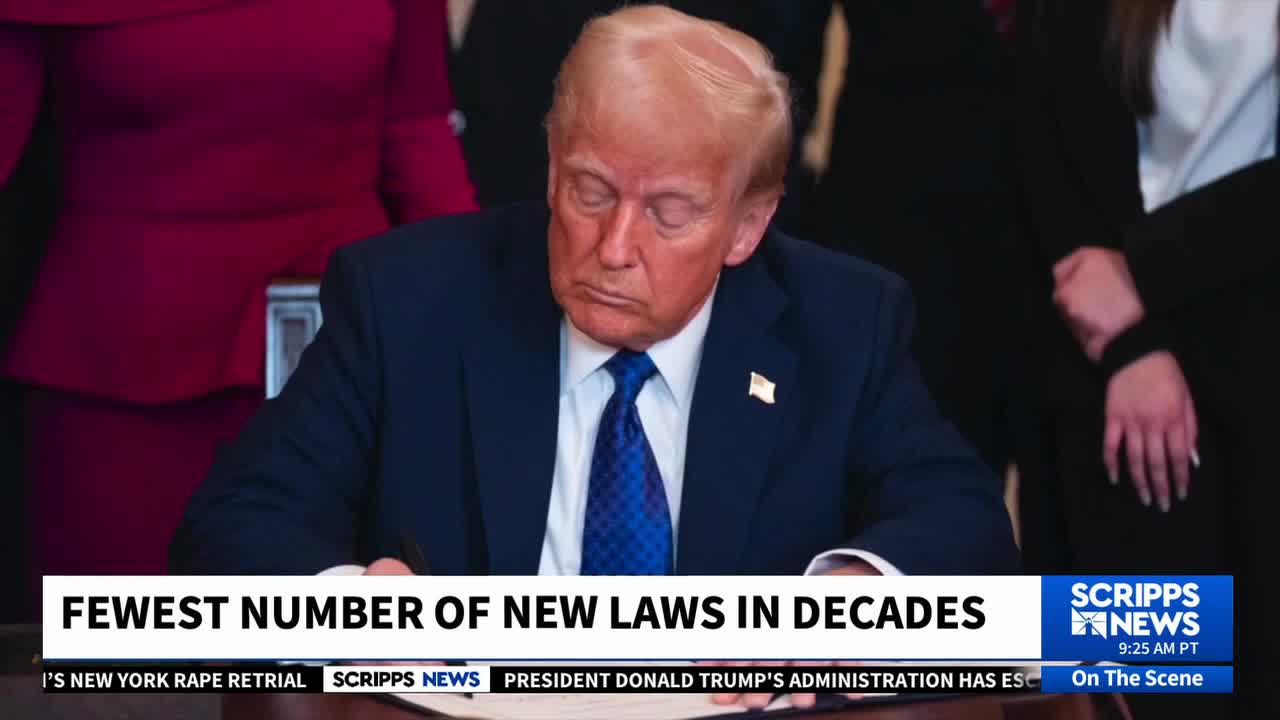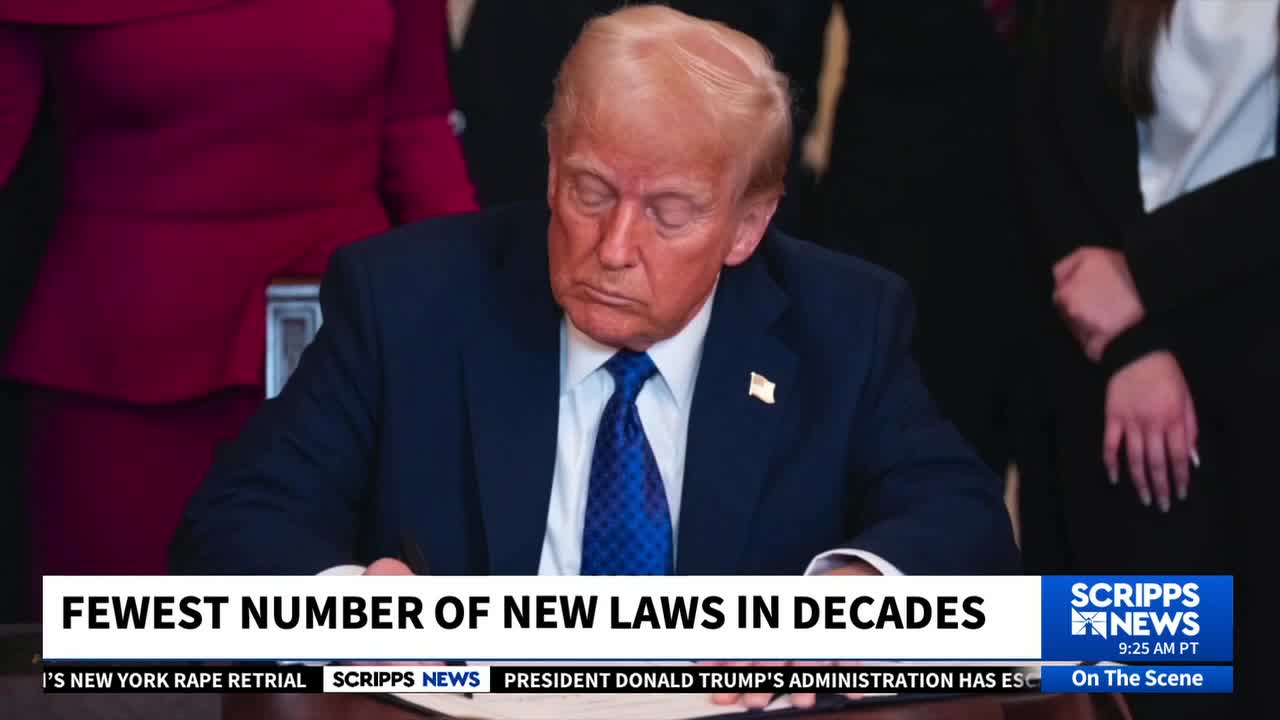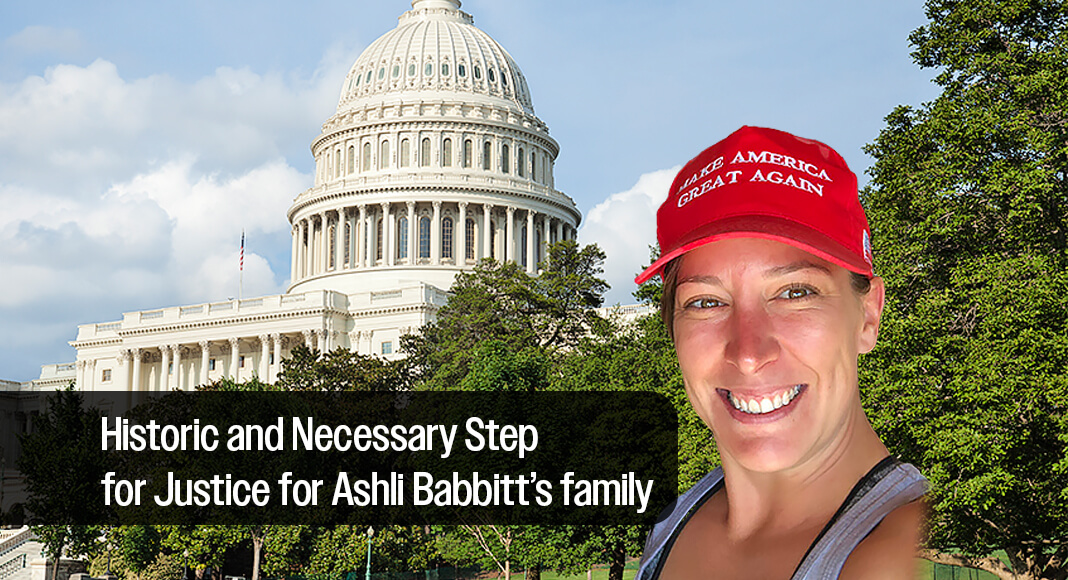
In his first 100 days, Trump signed a record number of executive orders. Now he faces a record number of lawsuits, some of which are heading to the Supreme Court and could redefine executive power.

Trump’s first 100 days: Record number of executive orders, few new laws
Comparing President Donald Trump’s legislative actions during the first 100 days of his term to those of past presidents. (Scripps News)
Scripps News
- Trump appears to be ‘testing the bounds of the law,’ according to one legal expert.
- The immigration disputes on issues that haven’t been challenged for more than 100 years could make the eventual court rulings the ‘most important era of immigration law’ in history, an expert said.
WASHINGTON – President Donald Trump‘s first 100 days have led to a record number of legal fights that are headed to the U.S. Supreme Court and where the justices will be asked to address questions that define the 250-year old relationship between the three branches of federal government.
These are battles of Trump’s own making: The second term president has been signing executive orders at a record pacewith 139 through April 24, that each test the boundaries of presidential power in areas such as government spending and immigration enforcement. More than 200 federal lawsuits have challenged Trump’s new policies, with multiple judges temporarily blocking his priorities.
Trump has already filed 11 emergency requests with the Supreme Court − more than during the combined 16 years of the George W. Bush and Barack Obama administrations. Legal experts say those cases’ eventual resolutions could bring profound changes to the relationships between the executive, legislative and judicial branches of government and on Trump’s chances of success in advancing his agenda.
“It certainly appears like this administration is testing the bounds of the law and trying to see how much they can get away with not following the requirements that Congress and the Constitution have established for the way the executive does their work,” Tobias Wolff, a law professor at the University of Pennsylvania, told USA TODAY. “That is a very alarming fact.”
Immigration cases ‘most important’ in history of country: expert
The immigration issues are momentous because some of the disputed questions have long been seen as settled.
Consider the 1798 Alien Enemies Actwhich allows for swifter removal of noncitizens and was never really tested in court outside a wartime context, according to Daniel Kanstroom, a law professor at Boston College who is director of the International Human Rights Program.
The Supreme Court in 1898 also upheld birthright citizenshipwhich Trump ordered changed during an Oval Office ceremony hours after his inauguration. Whether U.S. law can reach into an El Salvador prison is a fundamental question about the separation of powers between the president and courts.
“I think this is possibly the most important era of immigration law litigation that we’ve seen since the beginning of the country,” Kanstroom told USA TODAY. “I don’t think you can overstate the importance of all of the cases taken as a group that are before the court.”
Immigration cases among first to reach Supreme Court
One of the first executive orders Trump signed after returning to the White House aimed toend birthright citizenshipfor the children of immigrants without authorization to be in the country. The legal dispute over the order will be the first to get afull-blown hearing at the Supreme Court on May 15 − weeks after the term’s end of regularly scheduled hearings.
The 14thAmendment to the Constitution, ratified in 1868, says: “All persons born or naturalized in the United States and subject to the jurisdiction thereof, are citizens of the United States and of the State wherein they reside.” But Trump contends it was only meant to cover former slaves and not the modern influx of immigrants.
U.S. District Judge John Coughenour in Seattlecalled Trump’s order“blatantly unconstitutional,” one of at least four judges who blocked the policy.
Urgent appeals reach Supreme Court quickly
The cases are hurtling through the courts so quickly some justices complain there is no time to collect evidence.
Trump had invoked the 1798 Alien Enemies Act for the first time outside of a war against another country to hasten the deportation of members of the gangs Tren de Aragua and MS-13. But after hundreds of alleged gang members were sent to a notorious prison in El Salvador on March 15, Venezuelan migrants fought in court for hearings to deny belonging to the gangs.
The Supreme Court on April 19 temporarily blocked the removal of Venezuelans accused of being gang members of Tren de Aragua. The high court said in an unsigned opinion that detainees were “entitled to ‘judicial review’ as to ‘questions of interpretation of constitutionality’ of the statute.
Justices Samuel Alito and Clarence Thomas opposed the order as “unprecedented and legally questionable” before lower courts had weighed evidence in the case.
Trump said even the Supreme Court, with a 6-3 majority appointed by Republicans, stymied him. “The Courts are intimidated by the Radical Left who are, ‘playing the Ref,'”Trump wrote on social media on April 21.
Congress sets spending priorities but Trump treats them as ceilings
Besidestoughening immigration enforcementtwo other broad areas of legal dispute focus on cutting the size of government byfiring federal workersanddismantling agenciesas well asbanning diversity initiatives.
Federal unions, workers and advocacy groups have fought Trump’s moves to dismantle agencies and lay off tens of thousands of federal workers, under recommendations from billionaire adviser Elon Musk and the Department of Government Efficiency.
The Constitution designates Congress as holding the authority over spending by saying: “No Money shall be drawn from the Treasury, but in Consequence of Appropriations made by law.” ButTrump and his aides contend the president can spend lessthan lawmakers appropriate.
Firings played out in fits and starts. For example, Trump tried to fire tens of thousands of probationary workers buta court ordered them rehiredand anappeals court refused to halt that decision.
“It is a sad day when our government would fire some good employeeandsay it was based on performance when they know goodandwell that’s a lie,” wrote U.S. District Judge William Alsup in San Francisco, who ruled the agencies had to fire the workers rather than the Office of Personnel Management.
The Supreme Court on April 8 paused Alsup’s order to reinstate more than 16,000 workers fired by six agencies while the litigation continues. Alsup halted layoffs again April 18 and the administration asked the 9th U.S. Circuit Court of Appeals on April 23 to overturn his injunction.
The day after the Supreme Court’s order in the Alsup case, the 4th U.S. Circuit Court of Appeals paused a similar order from U.S. District Judge James Bredar in Maryland to reinstate probationary workers at 20 agencies in 19 states. It’s not clear when either case could reach the high court for full arguments.
Trump asks Supreme Court to allow military ban of transgender troops
Two judges have blocked a Defense Departmentpolicy to ban transgender servicemembersand the issue is another that has already reached the Supreme Court.
Trump and Defense Secretary Pete Hegseth contend transgender troops hurt readiness and lethality of the military. But lawyers for decorated servicemembers argued there wasno evidence transgender troops hurt the militaryduring four years of serving openly during the Biden administration.
After U.S. District Judge Benjamin Settle in San Francisco and the 9th U.S. Circuit Court of Appeals paused the ban, Solicitor General John Sauer asked the Supreme Court on April 24 to allow the Defense Department to enforce its prohibition. Sauer contends the judge improperly second-guessed the Pentagon’s policy, which he argued deserves “substantial deference” from the courts.
The D.C. Circuit Court of Appeals has a decision pending in a similar case.
Justice Elena Kagan asked the transgender troops to reply by May 1 in the West Coast case. But that decision would likely focus on whether the ban is paused while the case is argued, so it’s not clear how soon the high court could hear full arguments.
Trump opposes individual hearings for immigrants in changes of broad policies
Other lawsuits have also sought to stop the Department of Homeland Security from ending overlapping programs that provide hundreds of thousands of immigrants temporary protection from deportation because of unsafe conditions in their home countries.
One program calledTemporary Protected Statushas covered Venezuelans. Another program covered migrants fromCuba, Haiti, Nicaragua and Venezuela(CHNV).
U.S. District Judge Indira Talwani temporarily extended the CHNV program by ruling each participant deserved a hearing on whether their permission to work and live in the U.S. would be terminated.
The government said April 18 it would appeal to the 1st U.S. Circuit Court of Appeals.
Trump, who argued that he won the 2024 election on a policy of common sense, complained it would take 100 years for courts to hear the cases of 530,000 immigrants in the CHNV case.
“What is going on with our Courts? They are totally OUT OF CONTROL,”Trump wrote on social media on April 16. “They seem to hate ‘TRUMP’ so much, that anything goes!”
Trump accuses judges of partisanship, failing to heed election results
Trump has railed against judges ruling against his policies, which stokes concerns among Democrats and some legal experts that he could eventually defy court orders in a move that leads to a constitutional crisis.
The president has called for the impeachment of judges who rule against him, which led to a rare rebuke from Supreme Court Chief Justice John Roberts. Trump was particularly irate about multiple cases where a judge in one of the country’s 94 federal judicial districts temporarily blocked policies nationwide while the cases are litigated.
“These people are Lunatics, who do not care, even a little bit, about the repercussions from their very dangerous and incorrect Decisions and Rulings,” Trump wrote on social media on March 20after winning the 2024 election with 77 million votes. “These Judges want to assume the Powers of the Presidency, without having to attain 80 Million Votes.”
The House voted April 9 to prohibit individual judges from issuing nationwide injunctions. But it is unclear whether the Senate will approve the bill.
“We are obviously complying with the court’s order,” White House press secretary Karoline Leavitt told reporters April 22 after the Supreme Court paused the deportation of alleged gang members.
“We’re confident the Supreme Court will rule on the side of law and recognize the president absolutely has the executive authority to deport foreign terrorists from our nation’s interior under the Alien Enemies Act,” Leavitt added. “We’re confident the courts will side with the president’s executive authority.”
FBI charges state judge with allegedly helping immigrant avoid ICE
Trump’s clash with judges escalated April 18 with the FBI’s arrest in Wisconsin of Milwaukee County Circuit Court Judge Hannah Dugan and continued to test the limits of executive power.
She wascharged with interferencefor allegedly misdirecting Immigration and Customs Enforcement officers, who were trying to arrest Eduardo Flores-Ruiz, a Mexican citizen previously removed from the U.S.
“What happened was terrible. That that could happen with a judge is so ashamed,” Trump told reporters April 27. “We can’t let these people stay, and the courts are allowing them to stay. We’re just not going to allow it so, hopefully, the Supreme Court will come to the rescue of our country.”
Sen. Dick Durbin of Illinois, the top Democrat on the Judiciary Committee, criticized immigration officials for interfering with the criminal justice system.
“The Trump Administration continues to test the limits of our Constitution – this time by arresting a sitting judge for allegedly obstructing an immigration operation at the courthouse,”Durbin said in a statement.
What happens if Trump disobeys courts?
Two federal judges are investigating whether the Trump administration has defied their orders, another path to a constitutional crisis if the judges order an independent prosecutor to pursue criminal contempt charges. But legal experts saida criminal contempt findingwould be a serious step to be avoided.
U.S. District Judge James Boasberg in Washington, who was first to pause deportations under the Alien Enemies Act, ruled April 16 the government demonstrated a “willful disregard” for his order for not turning around the flights or ordering their return from El Salvador. “None of their responses has been satisfactory,” he wrote.
A divided D.C. Circuit Court of Appealspaused his inquiryon April 18 and called for written arguments about whether to stop the inquiry.
Josh Blackman, a law professor at South Texas College of Law in Houston, called it a “line that maybe shouldn’t be crossed.” Blackman said the Supreme Court could intervene is Boasberg finds contempt.
Another option would be that Trump could pardon anyone charged with contempt.
“One hopes that we don’t have to get to that brink in this case,” Kanstroom said.
In another case, U.S. District Judge Paula Xinis in Maryland has demanded updates about returning Kilmar Abrego Garcia from El Salvador after what administration officials acknowledged was his mistaken removal. The Supreme Courtbacked her up ambiguouslysaying the government should “facilitate” his return.
But Bondi said during an Oval Office meeting April 14 it wasup to El Salvador to return Garcia. Xinis postponed a demand for the government to share evidence in the case until April 30.
“I hope we don’t find ourselves in that situation,” Wolff, the law professor, said of potential contempt proceedings. “Certainly, I think the popular response to this administration saying ‘we can operate outside the boundaries of the courts’ would not be a favorable one.”



